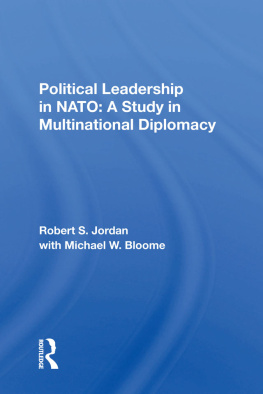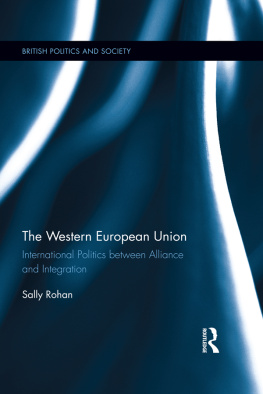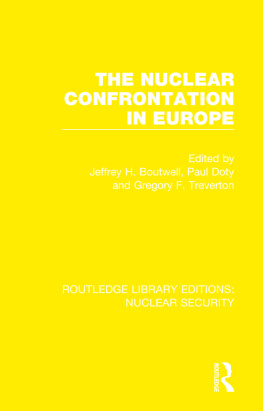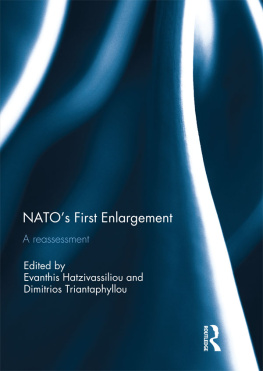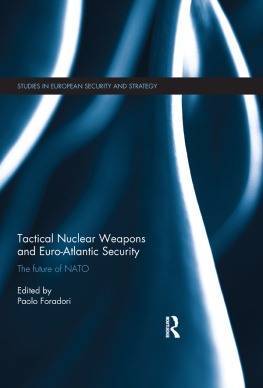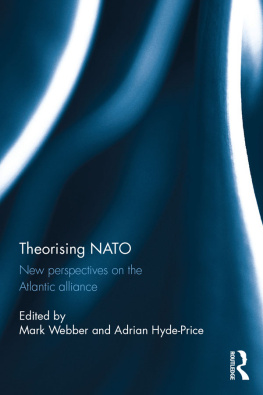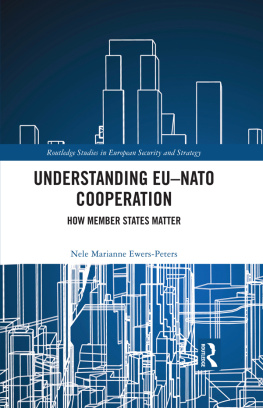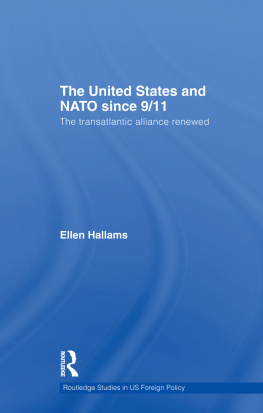Political Leadership in NATO
Other Titles in This Series
Presidents, Secretaries of State, and Crises in U.S. Foreign Relations: A Model and Predictive Analysis, Lawrence Falkowski
U.S. Policy in International Institutions: Defining Reasonable Options in an Unreasonable World, edited by Seymour M. Finger and Joseph R. Harbert
Congress and Arms Control, edited by Alan Platt and Lawrence D. Weiler
Crisis Resolution: Presidential Decision Making in the Mayaguez and Korean Confrontations, Richard Head, Frisco Short, and Robert C. McFarlane
U.S.-Japan Relations and the Security of East Asia: The Next Decade, edited by Franldin B. Weinstein
Communist Indochina and U.S. Foreign Policy. Postwar Realities, Joseph J. Zasloff and MacAlister Brown
National Interests and Presidential Leadership: The Setting of Priorities, Donald E. Nuechterlein
Arms Transfers to the Third World: The Military Buildup in Less Industrial Countries, Uri Ra'anan, Robert Pfaltzgraff, Jr., and Geoffrey Kemp
Westview Special Studies in International Relations
Political Leadership in NATO: A Study in Multinational Diplomacy
Robert S. Jordan
This unusual history of the first four secretaries-general of NATO and their importance in the postwar politics of Western defense is a study of diplomacyof individuals and the impact of their personalities on international events. It can perhaps best be described in terms of what it is not. It is not, for example, exclusively a book on NATO, nor is it a text on international organization. It is neither a history of European politics nor an analysis of East-West relations. It is not a specialized study of nuclear politics, and it does not pretend to be a record of the political interplay between the United States and its European allies. Yet all of these themes appear in the work.
In the course of preparing this book, Dr. Jordan came to know the four secretaries-general, as well as many other individuals involved in NATO since its inception. While his analysis is objective and he has thoroughly documented his observations, there is also a valuable personal element in his assessment of the impact the persons who occupied this relatively little known but very important office had on the institution they headed and the international political environment in which they operated.
Robert Jordan has been professor of political science at the State University of New York at Binghamton and is now adjunct professor of political science at Columbia University. He also serves as director of research at the United Nations Institute for Training and Research (UNITAR). He holds doctorates from Princeton and Oxford universities.
Political Leadership in NATO: A Study in Multinational Diplomacy
Robert S. Jordan
with Michael W. Bloome
First published 1979 by Westview Press, Inc.
Published 2019 by Routledge
52 Vanderbilt Avenue, New York, NY 10017
2 Park Square, Milton Park, Abingdon, Oxon OX14 4RN
Routledge is an imprint of the Taylor & Francis Group, an informa business
Copyright 1979 Taylor & Francis
All rights reserved. No part of this book may be reprinted or reproduced or utilised in any form or by any electronic, mechanical, or other means, now known or hereafter invented, including photocopying and recording, or in any information storage or retrieval system, without permission in writing from the publishers.
Notice:
Product or corporate names may be trademarks or registered trademarks, and are used only for identification and explanation without intent to infringe.
Library of Congress Cataloging in Publication Data
Jordan, Robert S., 1929
Political leadership in NATO.
(Westview special studies in international relations)
Includes bibliographical references and index.
1. North Atlantic Treaty Organization. I. Title.
JX1393.N67J67 341.72 78-6969
ISBN 13: 978-0-367-28345-2 (hbk)
This book is dedicated to the four persons at Oxford who first encouraged me to study the diplomacy and diplomatic methods of secretaries-general:
Max Beioff
W. F. Deakin
Norman Gibbs
Alexander Loveday

Ministerial meeting, NATO tenth anniversary, Washington, D.C., 2 April 1959.
In the course of the preparation of this book I have received invaluable help from many present and former officials of NATO. While I find it impossible to thank each individually, I do wish to make clear my appreciation: without their cooperation this work would never have materialized. I must, however, single out and express a deep sense of gratitude to the late W. Randolph Burgess who, more than any other person, opened doors and pointed me in the right direction.
I should also like to express thanks to the following persons who, in various capacities, have contributed to the completion of this effort: Anne Wallace Scoffier and her late father, Richard Wallace, former director-general of the Atlantic Council of the United States; John Vernon of the NATO Information Service; and graduate students Jacob Bercovitch and John Chiddick (of the London School of Economics and Political Science), David Ewing (of the School of Public and International Affairs, George Washington University), and Parley W. Newman, Jr. (of the Department of Political Science, Columbia University).
Finally, Pter Vukasin, of the State University of New York, and Davidson Nicol, executive director of the United Nations Institute for Training and Research, provided personal encouragement.
Robert S. Jordan
New York, June 1978
Perhaps the easiest way to introduce this book is to state what it is not. It is not, for example, a book on NATO, nor is it a book on international organization. It is not a history of European politics nor an analysis of East-West relations. It is not a study of nuclear politics; and it does not pretend to be a record of the political interplay between the United States and its European allies, though all of these themes do appear. Rather, this book represents a study in diplomacy: it is a history of four menthe first four secretaries-general of the North Atlantic Treaty Organizationand their importance in the postwar politics of Western defense. It is a study not of structure but of individuals and the impact of their personalities and vision on international events.
This is also a personal book. In the course of its preparation, I have come to know the four secretaries-general, as well as many of the other individuals involved in NATO since its inception, Although I have attempted to remain objective in my analysis and have employed historical and other published sources to verify my observations, there remains an element in the book that reflects a personal evaluation of these men. For any and all such observations and conclusions, I, of course, assume full responsibility.
Although the primary purpose of this endeavor lies in an exploration of the impact of four men on Western politics, any such discussion must take place within the context of their principal political arenaNATO. Raymond Aron, the distinguished French scholar, once observed that "the Atlantic Pact Aron's reference is to the fact that the North Atlantic Treaty constitutes an alliance, and that alliance in turn represents an important element in international politics.

